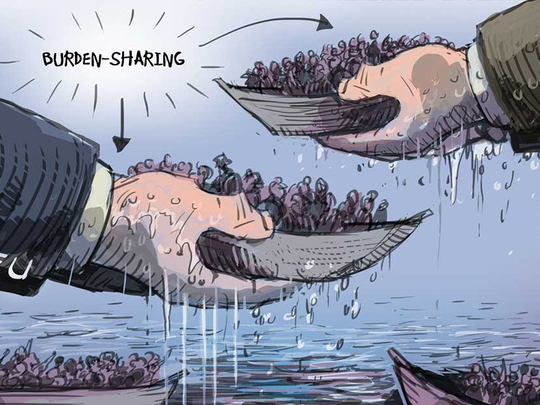
A human tragedy is unfolding in the Mediterranean, with hundreds of thousands of refugees risking – and, in many cases, losing — their lives for the chance to find refuge in Europe. How the European Union responds to this crisis matters not just for humanitarian reasons; it will also be a bellwether of the future of the Union itself. The EU must get it right.
Europe faces no shortage of challenges. Over the last five years, it has confronted a seemingly endless series of tests, including a eurozone-wide financial crisis, Russia’s invasion of Ukraine, renewed fears of a Greek default, and the prospect of a British exit. But none has raised such fundamental questions about the meaning of the EU as the current debate about migration.
Unfortunately, efforts so far have been inconsistent. The EU acted quickly in the aftermath of the drowning of more than 1,000 migrants in a particularly horrific episode in April, tripling the budget of its much-maligned naval surveillance operations and expanding their operational area to match Italy’s discontinued Mare Nostrum operation. This move has already borne fruit, with record numbers of rescues late last month.
Another initiative – the European Commission’s proposed “Agenda on Migration” – is less straightforward. The agenda presents a hodgepodge of measures in varying degrees of detail.
An important and controversial offshoot of the agenda is the action plan against migrant smuggling, which may include the use of military force to stop the smugglers’ boats. Critics have questioned the plan’s legality, the risk of collateral damage, and, most important, the effectiveness of armed intervention in stemming human-trafficking operations.
There is also the troubling prospect that such a showy initiative would, by creating the impression that the EU is taking action, enable the EU and its members to avoid the long-term commitment and politically unpopular measures that an effective crisis response would demand. And, indeed, the EU has so far been focusing on a largely symbolic measure: the proposed EU-wide relocation and resettlement system for asylum seekers.
At first glance, the relocation system – which would move 40,000 asylum-seekers from Italy and Greece to other EU members countries, with the allocation determined according to factors such as GDP, population, and the unemployment rate – may seem like a substantial step. But, with Italy alone having received more than 63,000 asylum applications and 170,000 irregular migrants last year, the program’s impact would be minimal.
The European Commission’s proposal is intended to underscore European solidarity and burden-sharing – both core EU principles. But the plan’s limited scope undermines this impression.
Worse, the response to the plan – with some member states opting out of the program; others objecting to how the quotas are to be measured; and still others bristling at the idea that the EU should propose a quota at all – seems to suggest that it is every country for itself. Throughout these discussions, the line between asylum seekers and economic migrants, who are not protected by binding international humanitarian conventions, has been blurred.
These squabbles in the face of undeniable, large-scale human suffering controvert the EU’s core values, including its commitment to adhere to a rules-based international order. They also reflect a disturbing trend affecting EU institutions: individual countries’ interests are increasingly trumping unity and cooperation.
The problem is that many Europeans regard the EU as either a dispenser of benefits, a bogeyman, or an albatross – not something to which they are obliged in any way. As the financial crisis has dragged on, and recriminations among member countries have weakened the sense of community that forms the EU’s foundations, the refugee challenge has exacerbated a dangerous divisiveness. Instead of reinforcing its foundations with solidarity and compassion, the Union has fractured.
In fact, Europe’s interest in mounting an effective response to the crisis extends beyond values. As rapid population aging generates significant fiscal pressures, EU members have a strong economic incentive to accept more immigrants. The short-term challenges that doing so would pose, however, seem to be obscuring this fact.
But the refugee challenge is not a short-term issue. On the contrary, with countries throughout the Middle East and Africa facing continued violence, poverty, and governmental breakdown, the crisis will only deepen. In Libya alone, an estimated 500,000 to one million additional migrants are awaiting passage to Europe.
It is time to place principle back at the forefront of policy. EU leaders must make a clear commitment to do what it takes to address the refugee crisis – even if that means pushing through measures, such as expanded options for legal migration, that are neither expedient nor popular. To facilitate implementation, the EU and its member states could initiate a campaign to educate the public about the benefits of a more supple and responsive immigration system.
No response, it must be stressed, would be complete without a sustained commitment to addressing the drivers of mass immigration – and that means a complete overhaul of the EU’s Neighborhood Policy. The new policy should focus on contributing to the creation of economic opportunities in countries with large unemployed youth populations, so that young people no longer feel that risking their lives to reach Europe is their only chance at a future.
All of this will require a sustained commitment, underpinned by a strong sense of common purpose. If Europeans do not stand together in addressing migration, countless more people will drown in the Mediterranean and the EU will continue to unravel. It is as simple as that.
Ana Palacio, a former Spanish foreign minister and former Senior Vice President of the World Bank, is a member of the Spanish Council of State and a visiting lecturer at Georgetown University.
— Project Syndicate, 2015












